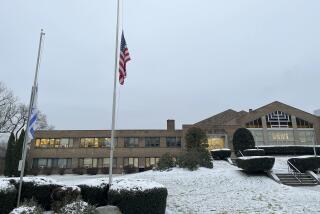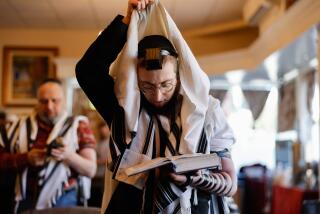Israel Charges Rabbi in Slaying of Arab
- Share via
JERUSALEM — Police have charged Rabbi Moshe Levinger, a militant proponent of Israeli settlement in the occupied West Bank and Gaza Strip, with the shooting death of an Arab shopkeeper during unrest last year, an Israeli Justice Ministry spokesman said Wednesday.
Levinger was indicted on charges of manslaughter, causing bodily harm and damaging property. The charges carry a potential sentence of up to 20 years in jail.
Last September, Levinger allegedly opened fire on Arabs in the West Bank town of Hebron with a 9-millimeter pistol after they stoned his car. The owner of a shoe store was shot to death outside his shop and a customer was wounded.
The indictment coincides with increased vigilante activity among settlers in the West Bank and Gaza Strip. The settlers feel that the Israeli army is doing too little to protect them from rebellious Arabs who use stones and gasoline bombs as the main weapons in their 17-month-old uprising against Israeli rule.
Levinger himself, when informed of the charges, countered that Defense Minister Yitzhak Rabin should go on trial for failing to quell the uprising, or intifada , as it is known in Arabic.
“Everything would stop if Rabin put an end to the intifada ,” Levinger said. “Many Arabs were killed and a few Jews, and who is guilty for all of this? The person who does not put an end to it. So they have to put him on trial.”
Levinger is a founder and leader of the Gush Emunim settlement movement, which has pressed for Israeli takeover of the West Bank and Gaza. He led the establishment of a settlement in 1968 near Hebron, a year after Israel occupied the West Bank and Gaza during the Six-Day War. Later, Levinger and other Gush Emunim members took up residence within Hebron itself. The town is sacred to both Jews and Muslims because it is considered the burial site of Abraham, a figure revered by both religions.
Over the years, successive Israeli governments have funded settlements despite criticism from the United States that they hinder efforts to end the Israeli-Arab conflict by making it increasingly difficult to reach a compromise with Arabs over control of the land.
There are now 139 settlements in the West Bank and Gaza, housing 70,000 Jewish Israelis. The Arab population of the territories is estimated at 1.7 million.
In recent months, settlers have stepped up complaints that they are being left unprotected to face stone throwers and firebombers in the territories. The deaths earlier this year of a taxi driver and a settler in separate incidents on West Bank roads increased their unease.
The settlers have begun forming rudimentary scouting units to watch for trouble on West Bank roads, and groups of militant settlers have carried out raids on Arab villages to vandalize homes in retaliation for stone-throwing incidents.
In the Gaza Strip, after Palestinians vandalized flower greenhouses at Jewish settlements, the Israelis retaliated by damaging Arab tomato hothouses.
Recently, settlers near Hebron impersonated journalists in order to safely approach Arabs hurling stones. In one incident, Arab witnesses claimed that a settler who had marked his car with a sign that said “Press” shot and killed a Palestinian.
Israeli officials have expressed concern that the uprising, which mainly pits Arab youths bearing stones against the Israeli army, might turn into an open communal conflict between Jewish civilians and Arabs.
According to Dedi Zucker, an Israeli member of Parliament, there have been 18 cases of Israeli civilians killing Arabs since the intifada began in December, 1987. Five cases reached trial, and there were two convictions, with a maximum sentence of five years.
More than 400 Arabs have died during the uprising, mostly at the hands of the army. Sixteen Israeli Jews have been killed by Arab stone throwers or firebombers or by stabbing.
More to Read
Sign up for Essential California
The most important California stories and recommendations in your inbox every morning.
You may occasionally receive promotional content from the Los Angeles Times.













